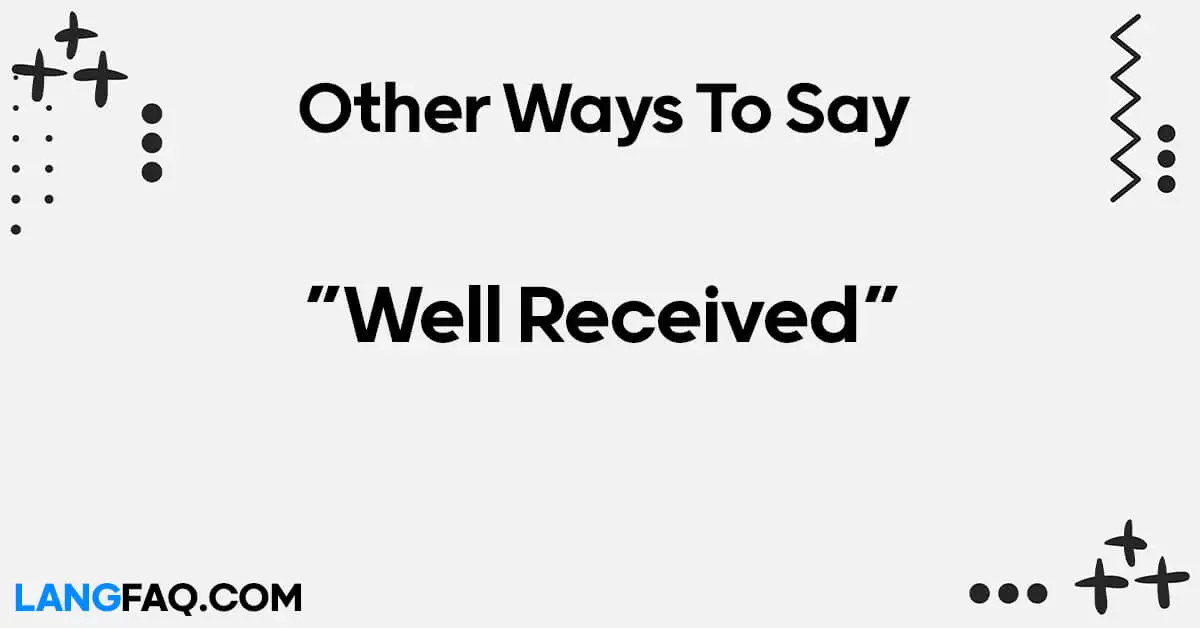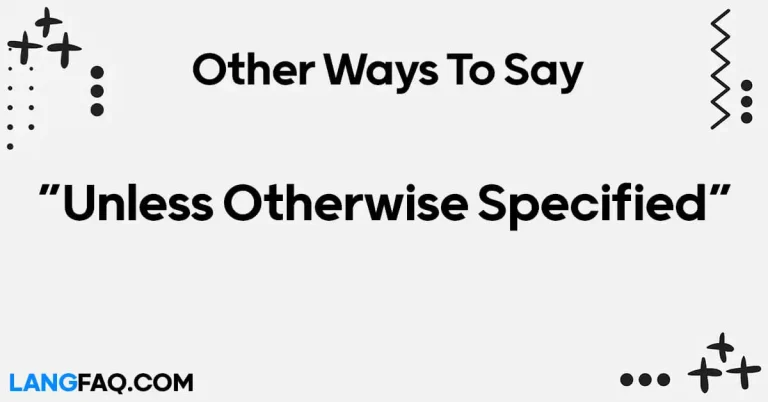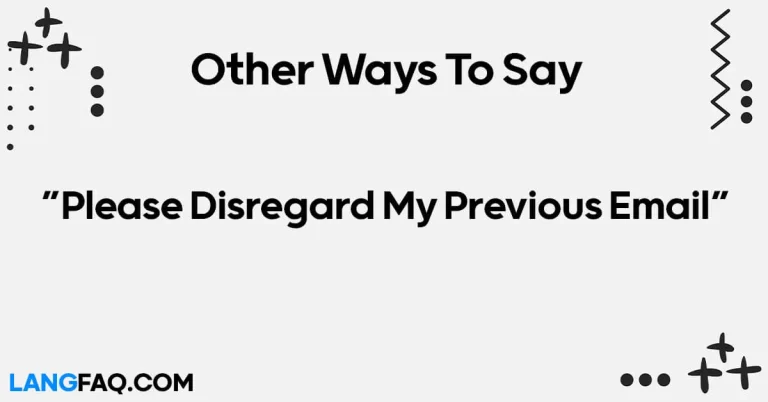In the vast realm of language, finding diverse ways to convey a simple sentiment can add depth and nuance to our expressions. This article delves into alternative phrases for “Well Received,” providing you with a linguistic arsenal to articulate acknowledgment and appreciation. Elevate your communication game with these compelling alternatives.
12 Other Ways to Say “Well Received”
Here are 12 alternative ways to express “Well Received”:
- Warmly Embraced
- Enthusiastically Accepted
- Wholeheartedly Acknowledged
- Cordially Welcomed
- Embraced with Open Arms
- Applauded and Acknowledged
- Greeted with Appreciation
- Met with Praise
- Received with Acclaim
- Acknowledged with Admiration
- Graciously Recognized
- Acknowledged with Open Hearts
Here’s a table with meanings and examples for the 12 alternative ways to express “Well Received”:
| Expression | Meaning | Example Sentence |
|---|---|---|
| Warmly Embraced | Greeted with genuine warmth and acceptance. | Her innovative ideas were warmly embraced by the team. |
| Enthusiastically Accepted | Met with genuine excitement and eagerness. | The proposal was enthusiastically accepted by the audience. |
| Wholeheartedly Acknowledged | Acknowledged with sincere and heartfelt recognition. | His dedication to the project was wholeheartedly acknowledged. |
| Cordially Welcomed | Greeted with warmth and friendliness, creating a welcoming atmosphere. | New members are always cordially welcomed to the team. |
| Embraced with Open Arms | Accepted without reservations, with an open and inclusive attitude. | The new initiative was embraced with open arms by the community. |
| Applauded and Acknowledged | Recognized and celebrated with applause and acknowledgment. | The artist’s performance was applauded and acknowledged. |
| Greeted with Appreciation | Acknowledged with a genuine sense of value and appreciation. | The hard work of the volunteers was greeted with appreciation. |
| Met with Praise | Acknowledged and celebrated with words of admiration and commendation. | The student was met with praise for their outstanding achievement. |
| Received with Acclaim | Acknowledged with high regard and public approval. | The novel was received with acclaim by literary critics. |
| Acknowledged with Admiration | Recognized with a deep sense of respect and admiration. | Her achievements were acknowledged with admiration by her peers. |
| Graciously Recognized | Acknowledged with a refined and gracious demeanor. | The donor’s generosity was graciously recognized by the organization. |
| Acknowledged with Open Hearts | Accepted with open-mindedness and inclusivity. | Diverse perspectives are acknowledged with open hearts in our discussions. |
In embracing these alternatives to “Well Received,” we find a tapestry of expressions that go beyond mere acknowledgment. From warmth and enthusiasm to admiration and grace, these phrases enrich our language, allowing us to convey appreciation in nuanced and diverse ways.
Is It Correct to Say “Well Received”?
Absolutely, saying “Well Received” is grammatically correct and widely used in English. It is a polite and formal way to acknowledge that something has been accepted, understood, or appreciated. This phrase is commonly employed in various contexts, such as:
- Acknowledging a Gift or Message:
- “Thank you for the gift; it was well received and much appreciated.”
- “The message you conveyed was well received by the audience.”
- Business and Professional Settings:
- “The proposal was well received during the board meeting.”
- “The new policy was well received by the employees.”
- Receiving Feedback:
- “I’m glad to hear that your suggestions were well received by the team.”
- “The report you submitted was well received by the client.”
- Events and Presentations:
- “The presentation was well received by the attendees.”
- “The event was well received, with positive feedback from the participants.”
Using “Well Received” reflects a positive response and indicates that the subject, whether it be an idea, message, or item, has been met with approval or acceptance. It’s a versatile and courteous expression suitable for both formal and informal communication.
Professional Mail Example With “Well Received”
Subject: Acknowledgment – Your Proposal is Well Received
Dear [Sender’s Name],
I trust this email finds you well. I wanted to take a moment to acknowledge the receipt of your recent proposal for [Project/Initiative Name].
I am pleased to inform you that your comprehensive proposal has been well received by our team. Your attention to detail and innovative approach align seamlessly with our objectives for the project. We appreciate the effort you’ve invested in presenting a thorough plan.
Over the next week, our team will carefully review the details outlined in your proposal. Should there be any additional information required, we will reach out promptly.
Once again, thank you for your dedication to this project. We look forward to the potential collaboration ahead.
Best Regards,
[Your Full Name] [Your Position] [Your Company] [Contact Information]
Warmly Embraced: Inviting a Genuine Connection
In the realm of effective communication, being warmly embraced transcends the ordinary acknowledgment. This phrase encapsulates a sense of genuine welcome and acceptance, creating a connection that goes beyond mere recognition.
Usage in Formal Context: In professional settings, using “Warmly Embraced” signifies a welcoming atmosphere for new ideas or team members. For example, during a business meeting, you can express, “Your proposal was warmly embraced by the board, reflecting the team’s eagerness to explore innovative solutions.”
Usage in Informal Context: In casual interactions, this phrase can be employed to convey heartfelt appreciation. For instance, when a friend shares personal achievements, respond with, “I warmly embrace your success and am genuinely happy for you.”
Variations for Different Relationships:
- Colleagues: “The collaborative effort was warmly embraced by our colleagues, fostering a positive work environment.”
- Friends: “Your decision to pursue your passion is warmly embraced by our friend group; we’re excited to see your journey unfold.”
Example Sentence: “The community warmly embraced the volunteer’s efforts, turning a simple project into a collective success.”
Email Sample:
Subject: Your Contribution to [Project Name]
Dear [Recipient],
I wanted to express how warmly embraced your contributions to the recent project were by the entire team. Your dedication and innovative approach did not go unnoticed, and we’re looking forward to future collaborations.
Enthusiastically Accepted: Igniting Collaboration with Excitement
When your ideas are not only accepted but met with enthusiasm, it marks a significant level of acknowledgment. “Enthusiastically Accepted” conveys a genuine excitement that fuels collaborative efforts.
Usage in Formal Context: In a professional setting, this phrase can be applied during project discussions. For instance, in a team meeting, express, “Your proposal was enthusiastically accepted by the department heads, signaling a green light for implementation.”
Usage in Informal Context: In casual conversations, using this phrase amplifies the positive response. If a friend suggests a plan, respond with, “I enthusiastically accept the idea; let’s make it happen!”
Variations for Different Relationships:
- Mentor-Mentee: “The mentor enthusiastically accepted the mentee’s innovative approach, fostering a culture of creativity.”
- Family: “Your decision to pursue your dreams is enthusiastically accepted by the family; we’re here to support you.”
Example Sentence: “The new marketing strategy was enthusiastically accepted by the team, sparking a collaborative spirit that led to unprecedented success.”
Email Sample:
Subject: Approval for [Idea/Project Name]
Dear [Recipient],
I am thrilled to inform you that your proposal has been enthusiastically accepted by the leadership team. Your innovative approach aligns perfectly with our goals, and we’re eager to see the positive impact it will bring.
Wholeheartedly Acknowledged: Recognizing Efforts with Depth
Acknowledgment, when expressed wholeheartedly, transcends a simple nod or recognition. “Wholeheartedly Acknowledged” signifies a profound recognition that goes beyond surface-level appreciation.
Usage in Formal Context: In professional environments, using this phrase emphasizes the depth of acknowledgment for significant contributions. During a review, express, “Your dedication to the project is wholeheartedly acknowledged, and your efforts have been integral to our success.”
Usage in Informal Context: In personal relationships, conveying wholehearted acknowledgment adds sincerity. For instance, when a friend supports you, say, “I wholeheartedly acknowledge your unwavering support; it means the world to me.”
Variations for Different Relationships:
- Colleagues: “The team’s efforts are wholeheartedly acknowledged by the management, recognizing the collective dedication.”
- Friends: “Your commitment to our friendship is wholeheartedly acknowledged; I’m grateful to have you in my life.”
Example Sentence: “The volunteer’s tireless efforts were wholeheartedly acknowledged by the community, fostering a sense of unity and shared purpose.”
Email Sample:
Subject: Recognition for [Project/Task Name]
Dear [Recipient],
I wanted to formally express how your contributions to [Project/Task Name] are wholeheartedly acknowledged by the entire team. Your commitment has not gone unnoticed, and we appreciate your dedication.
Cordially Welcomed: Creating an Atmosphere of Inclusivity
Welcoming gestures set the tone for an environment of acceptance. “Cordially Welcomed” goes beyond acknowledgment, creating a gracious and inclusive atmosphere.
Usage in Formal Context: In professional settings, using this phrase signifies a hospitable approach to new ideas or team members. For instance, during an onboarding session, express, “New members are cordially welcomed to the team, creating a positive and collaborative work culture.”
Usage in Informal Context: In personal interactions, employing this phrase conveys a warm and friendly demeanor. When a friend visits, say, “You’re always cordially welcomed here; make yourself at home.”
Variations for Different Relationships:
- Colleagues: “New colleagues are cordially welcomed to the company, fostering a sense of camaraderie from day one.”
- Friends: “Your friends are cordially welcomed to join the celebration; the more, the merrier!”
Example Sentence: “The guest speaker was cordially welcomed by the audience, setting the stage for an engaging and inclusive event.”
Email Sample:
Subject: Welcome to the [Team/Company Name]
Dear [New Team Member],
On behalf of the entire team, I extend a cordial welcome to [Team/Company Name]. We are thrilled to have you on board and look forward to achieving great milestones together.
Embraced with Open Arms: Fostering Trust and Inclusivity
To be embraced with open arms signifies acceptance without reservations, creating an atmosphere of trust and inclusivity. This phrase extends beyond mere acknowledgment, indicating a wholehearted acceptance of ideas or individuals.
Usage in Formal Context: In professional environments, employing “Embraced with Open Arms” can be powerful during organizational changes. For example, during a restructuring announcement, convey, “The new strategy is embraced with open arms by the leadership team, ensuring a smooth transition.”
Usage in Informal Context: In personal relationships, this phrase can deepen connections. When a friend shares personal news, respond with, “Your decision is embraced with open arms; I’m here to support you through this journey.”
Variations for Different Relationships:
- Mentor-Mentee: “The mentee’s fresh perspective is embraced with open arms by the mentor, fostering a culture of continuous learning.”
- Family: “Life changes are embraced with open arms by our family; we navigate challenges together.”
Example Sentence: “The collaborative project was embraced with open arms by the team, creating a culture of trust and openness within the workplace.”
Email Sample:
Subject: Embracing Change at [Company Name]
Dear [Team/Department],
I’m excited to share that the upcoming changes in our department are embraced with open arms by the leadership team. Your adaptability and positive outlook will contribute significantly to our collective success.
Applauded and Acknowledged: Celebrating Achievements with Fervor
Acknowledgment, coupled with applause, elevates the significance of contributions. “Applauded and Acknowledged” signifies not just recognition but a vocal celebration of achievements.
Usage in Formal Context: In professional settings, using this phrase can motivate teams during milestone celebrations. For instance, during a project completion event, express, “The team’s dedication is applauded and acknowledged by the entire organization, marking a successful journey.”
Usage in Informal Context: In personal relationships, employing this phrase adds a layer of encouragement. When a friend achieves a goal, say, “Your success is applauded and acknowledged; you deserve all the praise coming your way.”
Variations for Different Relationships:
- Colleagues: “Individual accomplishments are applauded and acknowledged during our monthly recognition events, boosting team morale.”
- Friends: “In our friend circle, personal achievements are applauded and acknowledged; we celebrate each other’s victories.”
Example Sentence: “The community project’s success was applauded and acknowledged during the town hall meeting, creating a sense of pride and accomplishment.”
Email Sample:
Subject: Congratulations on [Achievement]
Dear [Recipient],
Your recent achievement has not only been applauded and acknowledged by our team but has also inspired everyone. Your dedication is truly commendable, and we celebrate your success.
Greeted with Appreciation: Conveying Sincere Recognition
When acknowledgment goes beyond a simple nod and is accompanied by genuine appreciation, it becomes more impactful. “Greeted with Appreciation” reflects a sincere recognition of value, adding depth to expressions of approval.
Usage in Formal Context: In professional environments, using this phrase can enhance team dynamics. For instance, during a project review, express, “The team’s efforts are greeted with appreciation by the leadership, highlighting the valuable contributions made.”
Usage in Informal Context: In personal interactions, employing this phrase fosters positive connections. When a friend offers support, say, “Your kindness is greeted with appreciation; I am grateful for your friendship.”
Variations for Different Relationships:
- Mentor-Mentee: “The mentee’s commitment is greeted with appreciation by the mentor, creating a mentorship built on trust and mutual respect.”
- Family: “Family members are greeted with appreciation for their unique strengths and contributions; our bond is strengthened through mutual acknowledgment.”
Example Sentence: “The volunteer’s dedication was greeted with appreciation by the community, emphasizing the positive impact of individual contributions.”
Email Sample:
Subject: Appreciation for Your Contributions
Dear [Recipient],
I wanted to personally convey how your recent contributions have been greeted with appreciation by the team. Your dedication and hard work have not gone unnoticed, and we are grateful for your valuable input.
Met with Praise: Elevating Recognition to Commendation
Recognition, when coupled with praise, transforms acknowledgment into a vocal celebration of accomplishments. “Met with Praise” not only signifies approval but also involves verbal commendation for exceptional achievements.
Usage in Formal Context: In professional environments, using this phrase can motivate and boost morale. For instance, during an annual awards ceremony, express, “The team’s dedication is met with praise from the executive leadership, recognizing outstanding contributions to our organization.”
Usage in Informal Context: In personal relationships, employing this phrase adds a layer of encouragement. When a friend achieves something remarkable, say, “Your success is met with praise; you’ve truly outdone yourself!”
Variations for Different Relationships:
- Colleagues: “Individual successes are met with praise during our monthly recognition events, fostering a culture of mutual encouragement.”
- Friends: “Within our friend group, personal victories are met with praise; we believe in celebrating each other’s triumphs.”
Example Sentence: “The project manager’s leadership was met with praise during the project completion celebration, creating a positive and motivating work atmosphere.”
Email Sample:
Subject: Congratulations on Your Outstanding Achievement
Dear [Recipient],
Your recent accomplishment has not only been met with praise from our team but has also set a new standard for excellence. Your dedication is truly commendable, and we celebrate your remarkable success.
Received with Acclaim: Acknowledgment with High Regard
To be received with acclaim is to experience acknowledgment that transcends the ordinary. “Received with Acclaim” signifies recognition that comes with high regard, often involving public approval and admiration.
Usage in Formal Context: In professional settings, using this phrase can highlight the significance of achievements. For example, during a product launch, express, “The new product design is received with acclaim by industry experts, positioning our brand as a leader in innovation.”
Usage in Informal Context: In personal interactions, employing this phrase conveys a sense of high regard. When a friend accomplishes something noteworthy, say, “Your talent is received with acclaim; everyone is talking about your incredible achievements.”
Variations for Different Relationships:
- Mentor-Mentee: “The mentee’s accomplishments are received with acclaim by the mentor, reflecting a successful mentorship journey.”
- Family: “Family members’ achievements are received with acclaim, bringing pride and joy to our close-knit unit.”
Example Sentence: “The artist’s latest creation was received with acclaim at the gallery opening, solidifying their position as a respected figure in the art community.”
Email Sample:
Subject: Congratulations on Receiving Acclaim for Your Work
Dear [Recipient],
Your recent achievements have not only been received with acclaim within our organization but have also garnered positive attention externally. Your impact is far-reaching, and we commend you for your outstanding contributions.
Acknowledged with Admiration: Adding a Layer of Respect
Admiration adds a layer of respect to acknowledgment. “Acknowledged with Admiration” goes beyond a simple nod, reflecting a deep appreciation for contributions, skills, or qualities.
Usage in Formal Context: In professional environments, using this phrase can signify a profound recognition of excellence. For instance, during a team meeting, express, “The project manager’s leadership is acknowledged with admiration by the entire team, inspiring us to strive for excellence.”
Usage in Informal Context: In personal relationships, employing this phrase conveys sincere respect. When a friend demonstrates resilience, say, “Your strength is acknowledged with admiration; you truly inspire those around you.”
Variations for Different Relationships:
- Colleagues: “Colleagues’ unique talents are acknowledged with admiration, fostering a culture of mutual respect and appreciation.”
- Friends: “Among our friend group, individual qualities are acknowledged with admiration, creating a supportive and uplifting circle.”
Example Sentence: “The volunteer’s dedication to community service was acknowledged with admiration by local leaders, recognizing the positive impact on the community.”
Email Sample:
Subject: Recognition for Exceptional Leadership
Dear [Recipient],
I wanted to express how your leadership is acknowledged with admiration by the team. Your dedication and ability to inspire others have not gone unnoticed, and we appreciate your exemplary contribution.
Graciously Recognized: Elevating Acknowledgment with Sophistication
Recognition, when coupled with grace, transforms a simple acknowledgment into a refined gesture. “Graciously Recognized” conveys a sense of appreciation with a touch of sophistication, adding depth to expressions of approval.
Usage in Formal Context: In professional settings, employing this phrase can enhance the perception of appreciation. For example, during a company-wide meeting, express, “The team’s achievements are graciously recognized by the executive leadership, emphasizing the refined quality of our contributions.”
Usage in Informal Context: In personal interactions, using this phrase adds an element of refined acknowledgment. When a friend goes out of their way to help, say, “Your kindness is graciously recognized; your thoughtful gestures never go unnoticed.”
Variations for Different Relationships:
- Mentor-Mentee: “The mentee’s progress is graciously recognized by the mentor, fostering an environment of mentorship with poise.”
- Family: “Family members’ contributions are graciously recognized, creating an atmosphere of mutual respect within our household.”
Example Sentence: “The volunteer’s commitment to charitable causes was graciously recognized during the awards ceremony, reflecting a commitment to making a positive impact.”
Email Sample:
Subject: Recognition for Exemplary Contributions
Dear [Recipient],
I wanted to express how your recent contributions have been graciously recognized by the entire team. Your dedication and professionalism set a standard that inspires us all.
Acknowledged with Open Hearts: Fostering a Sense of Belonging
Acknowledgment with open hearts signifies a welcoming and inclusive acceptance. “Acknowledged with Open Hearts” goes beyond mere recognition, creating an atmosphere of belonging and camaraderie.
Usage in Formal Context: In professional environments, using this phrase can set the tone for collaborative teamwork. For example, during team-building exercises, express, “New team members are acknowledged with open hearts, fostering a positive and inclusive work culture.”
Usage in Informal Context: In personal relationships, employing this phrase strengthens emotional connections. When a friend shares personal challenges, say, “Your vulnerability is acknowledged with open hearts; we’re here for you through thick and thin.”
Variations for Different Relationships:
- Colleagues: “The collaborative efforts of colleagues are acknowledged with open hearts, promoting a sense of unity within the workplace.”
- Friends: “Individual quirks and qualities are acknowledged with open hearts among our friend group, creating a tight-knit circle.”
Example Sentence: “The community project’s success was acknowledged with open hearts by local residents, reinforcing a sense of community and shared purpose.”
Email Sample:
Subject: Welcome to the Team
Dear [New Team Member],
On behalf of the entire team, I extend a warm welcome to you. Your presence is acknowledged with open hearts, and we look forward to achieving great things together.
Frequently Asked Questions (FAQs)
How do these phrases differ from the simple “Well Received” expression?
In essence, these alternatives add depth and nuance to acknowledgment. While “Well Received” is a straightforward acknowledgment, the suggested phrases carry additional connotations of warmth, enthusiasm, and admiration, providing a richer communication experience.
Can these alternatives be used in both formal and informal settings?
Absolutely! The versatility of these phrases allows them to be seamlessly integrated into both formal and informal contexts, enhancing your ability to express acknowledgment in various scenarios.
Are these alternatives suitable for written communication as well?
Certainly. These phrases can be effectively employed in written communication, adding a layer of sophistication and sincerity to your expressions of acknowledgment in emails, letters, or other written forms.
Do these alternatives apply to both individual and group acknowledgment?
Yes, these phrases can be adapted for both individual and group acknowledgment. Whether you’re expressing appreciation to a single person or an entire team, these alternatives offer versatility and impact.
How can I incorporate these phrases into my daily communication?
Start by identifying the context in which you want to express acknowledgment. Choose a phrase that resonates with the level of appreciation you wish to convey. Practice incorporating these alternatives into your conversations for a more impactful communication style.
Is there a cultural aspect to consider when using these alternatives?
While these phrases are generally versatile, it’s essential to be mindful of cultural nuances. Ensure that the expression you choose aligns with the cultural context to avoid any potential misinterpretation.
Conclusion
In the realm of expressions, the alternatives to “Well Received” open doors to a richer, more nuanced communication experience. From warm embraces to gracious recognition, these phrases allow you to convey acknowledgment with depth and sincerity. Incorporate them into your communication repertoire, and watch as your expressions of appreciation resonate more profoundly.







